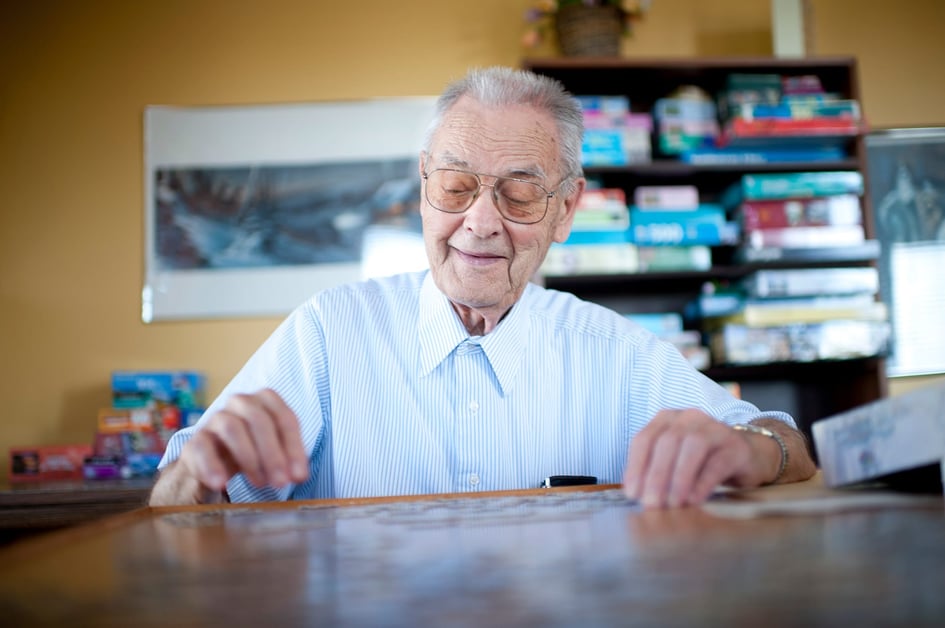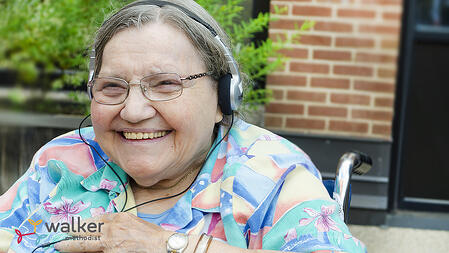6 brain-supporting activities for dementia patients
Christine Kelly | Jun 22, 2021

If your loved one has been diagnosed with dementia, you may be wondering if there are any games, exercises, or activities that you can use to support continued memory function.
Good news: the answer is yes! Participating in activities that promote continued mental sharpness is scientifically proven to preserve brain function.
Despite the hardship of a memory loss diagnosis, there is something proactive and meaningful you can do. Memory loss support activities for dementia patients don’t have to feel like work. In fact, participating in structured cognitive stimulation can further deepen the relationship between you and your friend or relative.
In a 2017 Italian study, scientists found that 30-45 minutes of various cognitive stimulation exercises only twice a week showed improvements in short-term memory and quality of life. So even if your time with your loved one is limited, you can make a difference.
Below, we’ll cover six helpful activities for seniors with memory loss, and provide you with proven memory loss support activities for dementia patients at any stage.
1. Discuss past events and memories
For seniors with dementia, it’s often easier to recall long-ago events than more current ones. And for you, it can be wonderful to hear about their childhood memories, and allow them to feel heard and valued. Simple conversations can be a great activity to help with memory loss.

Ask open-ended questions, and if memory slips occur, don’t linger on them or continuously try to correct their perspective on memories. Consider recording conversations on your phone or camera. You never know when rare family anecdotes will arise! Bringing family videos or photo albums to look at together can also spark wonderful conversations and reminiscing.
Some great conversation starters include:
- What’s your favorite holiday memory as a child?
- What was the best gift you ever received?
- What’s your strongest memory from childhood?
- Who was your favorite family member/best friend when you were young?
- What was your favorite topic in school?
2. Play word games
As we get older, it gets easier to forget words, with or without a dementia diagnosis! By playing word games together, both you and your loved one will benefit from a cognitively stimulating activity. Word games not only serve as a bit of a brain workout, but they can be fun!
Plenty of bookstores and online shopping platforms have generalized word puzzle books available for purchase. There are also board games that focus on words, such as Scrabble, Boggle, Bananagrams, and Balderdash. Crossword puzzles count too!
More free-form games can also be fun. Consider just going back and forth with word associations (e.g. “Dog” “Bone,” “Chicken” “Dinner,” “Hungry” “Stomach,” and so on). Or go one sentence at a time and try to make up a story. You could even try challenging your loved one to name two objects that start with each letter in their first name.
3. Solve puzzles
Simple jigsaw puzzles provide opportunities for problem-solving, coordination, and color-matching. Not to mention, their difficulty can be adjusted based on your loved one’s current abilities.
Puzzles are also great because they don’t have to absorb your entire attention. Combine some puzzle-solving with a bonding conversation, and you’ll fill an entire afternoon and work your loved one’s brain from multiple angles.
4. Play or listen to music
 Even if your loved one with dementia wasn’t a musician in their youth, everyone loves music. It’s comforting, relaxing, and is closely associated with memory and emotion. Finding music that your loved one enjoys can be a great bonding experience, and provide them a sense of calming nostalgia.
Even if your loved one with dementia wasn’t a musician in their youth, everyone loves music. It’s comforting, relaxing, and is closely associated with memory and emotion. Finding music that your loved one enjoys can be a great bonding experience, and provide them a sense of calming nostalgia.
Try finding out their favorite singer or band, and listen to these artists together. If you can find a video of this artist on YouTube, watch them perform together! Listening to music will often dredge up memories of when your loved one first heard their favorite songs.
If they’re capable, you can also incorporate movement by dancing together to their favorite music.
Music & Memory™ is just one of the programs offered to our Kaleidoscope residents at Walker Methodist. Playing music or singing together can be a fantastic way to stimulate the brain. Even those suffering from late-stage dementia will often be able to hum or sing music, as songs are processed in multiple parts of the brain, and stay in long-term memory.
5. Bake together
Cooking or baking as a team is not only a wonderful bonding experience, but you get something delicious at the end! Choose a simple recipe, and you’ll find that your loved one is practicing physical coordination, math, direction-following, and decision-making in a task-focused environment.
Depending on the capabilities of your senior, it’s up to both of you to determine how much they can safely help. Always be careful when working with knives and hot stoves or ovens.
6. Try indoor gardening
Gardening, indoor or outdoor (depending on the physical capabilities of your loved one,) uses a wide variety of skills. It provides sunshine and a bit of exercise, while giving a dementia patient something to track and nurture.
Gardening will give you and your loved one a sense of accomplishment, and can even (eventually) get you some fresh ingredients for when you cook together!
If you have outdoor space, weeding, sweeping, watering, and organizing a garden are all achievable tasks for people with dementia. If you’re stuck indoors, getting an herb planter or buying a few succulents can still provide a senior with a sense of responsibility.
Your time & your attention matter
Activities for individuals who have memory loss don’t have to be complicated. Even the simplest of things — having a good conversation, or reading a book together — can have a huge impact on a senior with memory loss. Spending focused time listening to them, playing with them, and assuring them that they are still loved and supported, can make all the difference.
Memory care at Walker Methodist
We’ve re-named our memory care communities Kaleidoscope, a fitting name suggesting metamorphosis, vibrancy, and life.
At Walker Methodist, we don’t just take care of people with memory loss or dementia. We see their value and recognize their worth in this stage of their lives. We not only meet their physical needs, but we care for the needs of the person as a whole being.
If you have a loved one who is experiencing this transformation, reach out to our team today and learn how we can help enhance their lives, even during this time of change.

